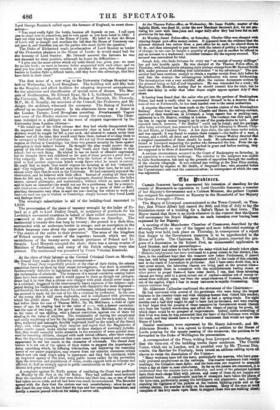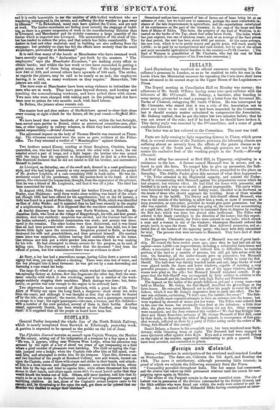'Ube itIrobintes.
Captain Somerset having announced his intention of standing for the county of Monmouth iu opposition to Lord Granville Somerset, a member of her Majesty's Government and a Cabinet Minister, the gallant Captain has resigned his appointment as Equerry in the Household of her Majesty the Queen Dowager.—Times.
The Mayor of Liverpool communicated to the Town-Council, on Tues- day, that Prince Albert had named. the 30th and 31st of July to lay the foundation-stone of a building for a Sailor's Home in that town. The Mayor stated. that there is no truth whatever in the rumour that the Queen will accompany hie Royal Highness, no such intentiou ever having been expressed by her Matiefity.
A meeting of the Manchester Chamber of Couswieree, described by the Morning Chronicle as one of the largest and most influential meetings of that body ever held, took place on Thursday, in consequence of a report that danger to the Government measures is to be apprehended in the Rouse of Lords, The Chairman, Mr. T. Bazleyjuuior' reported the pro- grass of a deputation to Sir Robert Peel, an unsuccessful application to Lord Stanley, and other peorseellings-
Much injury had arisen to trade from the delay which had already taken place. " Hitherto employment has been continued to a great extent in this district, I be- lieve, in the confident hope that the measure now before Parliament, if passed into law, will bring immediate and permanent relief to the trade of this country, and to the trade of Lancashire in particular. And I have seine doubt that, to a vary great extent, the labouring classes are being paid at the present time more especially those in connexion with the establahmeata having steam or other power to propel them-1 have some doubt, I say, that them labouring classes are being paid to a great extent out of capital—usither out of money re- ceived from ordinary sales, nor from the usual resources of business, but clearly out of the capital, which I fear in merry instances is rapidly diminishing. This cannot continue long." Air. Alderman Callender confirm/al the statement of the Chairman—
He had conversed with several of the gentleman who ware doing the largest business in the country-trade and with shipping-houses that visited this market; and, one and all, they said they never had so bad a spring-trade. For eight menthe and a half they might he said to have had no business, and were waiting in fowl hopes that the passing of these measures by Government would liberate corn from the bonded warehouses, and afford the means of paying for goods, till which there could be no prospect of improvement. Indeed, unless something of that kind was dews he was persuaded that the fears of the Chairman were within the mark, and they should have a degree of excitement that would act upon the Rouse of Lords.
Similar sentiments were expressed by Mr. Henry .Ashworth, and Kr. Alderman Brooks. It was agreed to forward a petition to the House of Lords, praying for the speedy passing of the measures; the petition to be forwarded to the Duke of Wellington for presentation.
A correspondent of the Times, writing from Liverpool on Saturday, says that the turn-out of the building, trades there continues. The Central Union, which sits its London, and is presided over by Mr. Thomas Dun- combo, tha Member for Finsbury, We issued as address calling upon all classes to resist the dissolution of the Unions.-
" Many workmen have left the town, particularly the masons, who have gene- rally procured employment on the railways. The master tradesmen hold weekly meetings; the Unionists meet daily; and the turn-outs are required to assemble twice a day at their vraious clubrooms. So far as the joiners are concerned, it is understood that the masters have no difficulty, and most of the principal builders have their work-shops filled with joiners, and many of them do not require any additional hands. A considerable number of strangers have taken the places of the turn-outs, particularly among the bricklayers and plasterers; aid, notwith- standing the vigilance of the pickets at the various building-yards and at the railway station, the number Sr daily on the increase. Many of the men at work complain of the levy made upon them to support those who are walking about;
and it is really lamentable to see the number of able-bodied workmen who are wandering unemployed in the streets, and suffering the fine weather to pass away in idleness." " In Birkenhead, many mea have quitted the Union, and are now at work. The timber-merchants are feeling most severely- the stoppage of build- mg as there is a greater suspension of work in the manufacturing districts than in Liverpool; and Manchester and- its vicinity consumes a large quantity of the timber which is imported into Liverpool. The accumulation of the stock of tim- ber has tended to reduce the price, and that article has fallen considerably. The dealers in lead and other materials need in building are also suffering from the stoppage; but probably no class has felt the effects more severely than the small shopkeepers, particularly at Birkenhead."
It is said that many of the hands at Manchester who have resumed work have secretly signed the " declaration" put forth by the masters. " The employers," says the Manchester Examiner," are making every effort to obtain hands; and within the last week or two have succeeded in getting a great many, most of them being strangers. One of the largest firms has now 340 or 350, and several others have upwards of 100 each. The strike, as regards the joiners, may be said to be nearly at an end; the employers having, it is said, as many workman as they require." Meanwhile, 700 joiners are still out.
The tarn-outs at Manchester have been using violence to intimidate the mea who are at work. They have gone beyond threats, and hooting and insulting the nonconforming workmen, and have pelted them with stones. Two men who were charged with taking part in the pelting and riot have been sent to prison for two months each, with hard labour.
In Bolton, the joiners alone remain out.
-The master boot and shoe makers of Sheffield have agreed to close their shops every evening at eight o'clock for the future, all the year round.--Sheifleld Mer- cury. We have heard that some hundreds of writs have, within the last fortnight, been served upon parties in Bristol, either as provisional committee-men, allot- tees, or other capacity in railway schemes, in which they have unfortunately in- curred respensibility.—Bristol Journal.
The adjourned inquest on the body of Thomas Blewitt was resumed on Thurs- day. The witnesses examined were the same as gave evidence at the Police- office. The Jury returned a verdict of " Manslaughter" against Graham.
Two brothers named Kinsey, residing at Great Boughton, Cheshire, having quarrelled, one, who had been drinking, struck the other with a hook; the one assailed seized a pair of tongs, and a fight began: the brother who was armed with the tongs beat his opponent so desperately that he died in a few hours. The fratricide declared that he did not intend to kill his brother, and surrendered bimeelf to justice.
At Liverpool, on Saturday, one of the swell mob, dressed in a meet gentlemanly style, and who had lodged recently at very respectable hotels, picked the pocket of Mr. Andrew Leighton, of a case containing 2601. in bank-notes. He was im- mediately seized by the gentleman, with the pocket-book in his hand. A third person, who witnessed the transaction, thought, from the appearance of the prisoner, that'he was a friend of Mr. Leighton's, and that it eras all a joke. The thief has been committed for trial.
In August 1844, John Weeks murdered his brother Edward, at the village of Bexley, near Maidstone: until three weeks since nothing was heard of the crimi- nal, though 1001. had been offered for his apprehension; but on the 2d instant, a body was found in a pond at Brenchley, near 'Tunbridge Wells,which was identified as that of John Weeks; and it appeared that he had been recently in the employ of a neighbouring farmer. It is supposed that the murderer committed suicide.
fearful discovery has been made near North Walshem, in Norfolk. Mr Jonathan Balls, who lived at the village of Happisburgh, his wife, and four grand- children, died very suddenly: suspicion was excited, and the Coroner had two of the bodies exhumed; a chemical examination was made, and arsenic was disco- vered in the remains. The other bodies were then disinterred, and it was found that all had been poisoned with arsenic. An inquest has been held, but it has thrown little light upon the occurrence. Suspicion pointed to Balls, as having destroyed his wife and grandchildren, and then poisoned himself. His conduct years since was suspicious, children having died suddenly while at his house. One witness saw him pat a white powder into some tea which he was making for his wife. He had attempted to obtain arsenic for the pa , as he said, of killing rats. The Jury returned a verdict that the d " died from the effects of poison, but how administered there was no evidence to show."
At Bury, a boy has had a marvellous escape, having fallen down a narrow well eighty feet deep, yet only suffered a ducking. There were nine feet of water, and the boy plunged into it head foremost: he was got out by a man descending and fastening a rope round his body.
The large ily-wheel of a steam-engine, which worked the machinery of a cot- ton-spinning &dozy at Ashton, flew into fragments the other day, from the enor- mous velocity with which it was revolving, caused by a number of the work- people suddenly stopping their machines. Much damage was done; but, fortu- nately, no person was near enough to the engine to be seriously hurt.
Two shipwrecks have occurred off Harwich, with a great loss of life. The Alert of Whitby ran upon the Long Sand, a dangerous shoal about ten miles from the coast; and although it was thought at first that she would be floated off by the tide, she capsized: the master, four seamen, and a passenger, managed to escape in aboat; but eight passengers—two men, a woman, and five children— with a number of the crew perished, several of them in their berths. Another v.pesel, apparently Danish, has been wrecked on the Gunfleet, near the Long Sand: it is supposed that all the people on board have been lost.



























 Previous page
Previous page